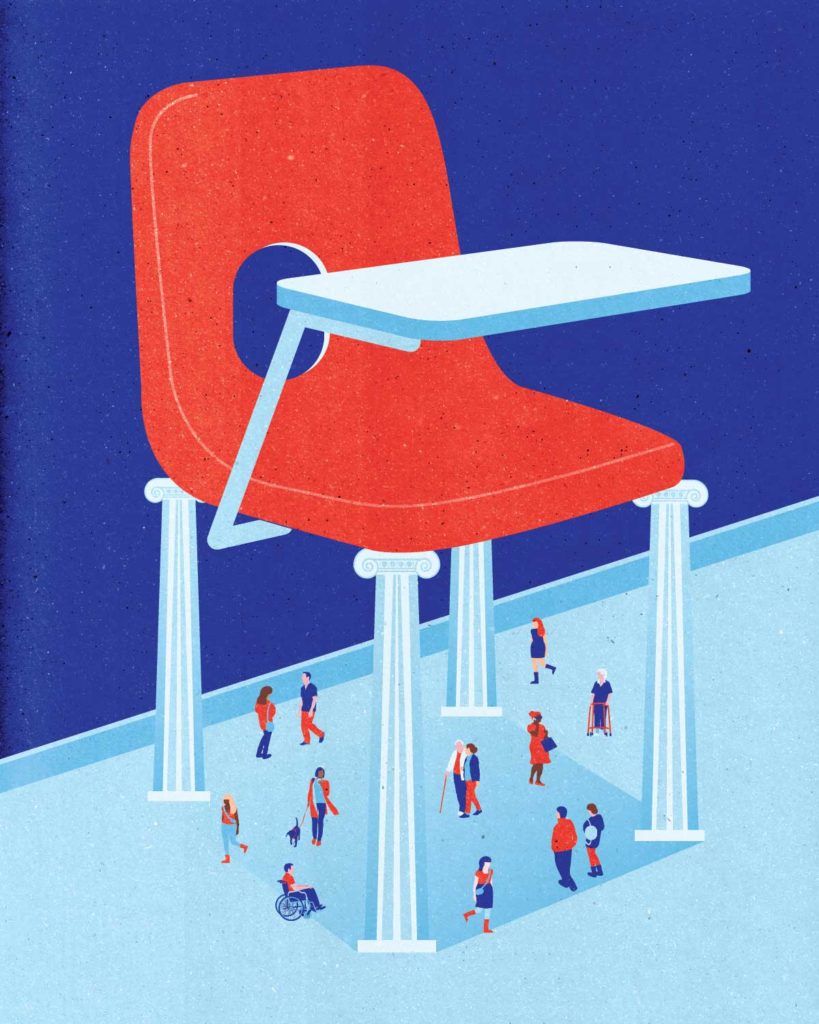The Community Law Clinic
Business is brisk at Stanford’s Community Law Clinic (CLC) in East Palo Alto. And while much has changed in the small city since the founding of Stanford Law’s first clinic in the 1980s, the student-run East Palo Alto Community Law Project, much has remained the same. “Believe it or not, one thing hasn’t changed: Low-income people don’t have lawyers,” says Juliet Brodie, director of CLC and associate dean of clinical education.
This bustling law office serves low-income residents of East Palo Alto and communities near Stanford in three major areas of direct service: eviction defense, expungement of criminal records, and assistance obtaining Social Security disability benefits. And the clinic’s services are in high demand, making it a magnet not only for clients but also for SLS students who want firsthand experience representing them says Brodie, who is joined in supervising the students by two other experienced instructors, Danielle Jones and Lisa Douglass.
It was the prospect of working directly with individual clients that led Zachary Glubiak, JD ’18, to join CLC. “I had taught before law school and missed the human interaction. I enjoyed my classes, but sometimes the theory felt removed from people’s experiences. I wanted to develop a deeper understanding and appreciation of the ways in which the law interacts with individuals,” he says.
Glubiak also was attracted by the clinic’s focus on social justice. “Everything the clinic does—protecting housing rights, expunging convictions from criminal records, or helping folks pursue disability benefits—advances the clinic’s anti-poverty mission.”
Of particular value to Glubiak was the litigation exposure he received representing local residents facing eviction proceedings. “Those cases involve a four week summary process, from the filing of the complaint to trial. That allows students to see the full life span of litigation and gain an appreciation for how individual decisions—within, say, discovery—fit into the big-picture strategy of the case.” To continue this work, he enrolled in the advanced clinic. “I felt like I was able to use what I had learned in law school to help my clients and add value in negotiations with landlords,” he says.
Like Glubiak, Matthew Garcìa, JD ’18, focused mainly on eviction defense, both as a full-time and advanced clinic student. “I spent the summer after my 1L year at the ACLU in Detroit and I knew that I wanted to do direct service. And I’d always been interested in housing issues.”
And while most clinic alumni go on to practice law at a firm, García says that CLC directly influenced his career decision. Following graduation and the bar exam, he will be a public interest fellow at Texas RioGrande Legal Aid in San Antonio, where he hopes to gain a permanent position upon completion of the one-year fellowship.
“The part of CLC that I valued most,” says García, “was the client-based, people-centered, relationship focused aspect of the work. I also really appreciated the balance that Juliet struck between giving input and guidance, while giving us significant responsibility. She
is a great teacher.”

In addition to representing individual clients in their cases, the clinic docket includes ways to engage students with policy issues in the three practice areas. “It’s a great supplement for individual representation,” Brodie says. “All of our clients’ legal problems arise from underlying social problems, most singularly the problem of poverty but also racial disparities in policing, lack of medical and mental health care for the poor, and, of course, the lack of attorneys for low-income people in civil cases. Students are hungry for the larger issues and in East Palo Alto we have a front-row seat to the income inequality emergency that affects the Bay Area and the whole country.”
Accordingly, over the past few years, CLC has been assisting community groups that are seeking to pass rent stabilization measures through citizen ballot initiatives. Brodie notes that this type of representation raises some very different questions: “What does it mean to have an organization as a client? What does it mean to be a lawyer in this situation, helping the organization get to consensus? What’s the difference between being a lawyer and being a political consultant? What duties do we owe, and to whom?”
While she was a full-time student, Gemma Donofrio, JD ’18, focused on the implementation of Mountain View, California’s rent control ordinance, which the clinic had been instrumental in drafting in 2016. Now, she is doing similar work with a group of activists in Santa Rosa, California, who hope to pass their own rent control measure in 2018. “It has been a great experience to learn about the needs of Santa Rosa residents and then work together to craft policy language that best reflects their goals,” she says. “Santa Rosa has a much larger population than Mountain View and, accordingly, each city has its own priorities.”
Donofrio also has worked on expungement cases and last spring represented a client who had been in the U.S for decades. “My client had a small, decades-old conviction on her record that put her at risk for deportation,” Donofrio explains. “My supervising attorney, Danielle Jones, and I were able to vacate the conviction, reducing the possibility that our client could be deported. I greatly appreciated the opportunity to work with an incredible client, as well as to learn more about the intersection of immigration and criminal law.”
Regardless of which projects CLC students work on, the experience working as full-time lawyers, learning the skills that they’ll need to practice law, is invaluable. As Glubiak says, “CLC gave me a sense of what it’s like to be someone’s lawyer. You develop and mature very quickly when you realize the trust that people put in their attorneys, and I’ve had the opportunity to work with some incredible clients. I came to law school because of my belief in the possibility that the law can be a force for good in people’s lives, and my experience within CLC has reaffirmed that conviction.” SL
